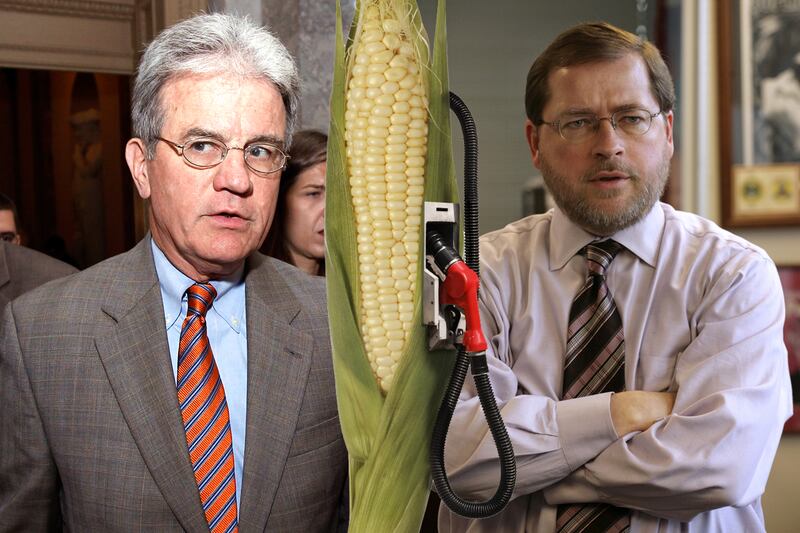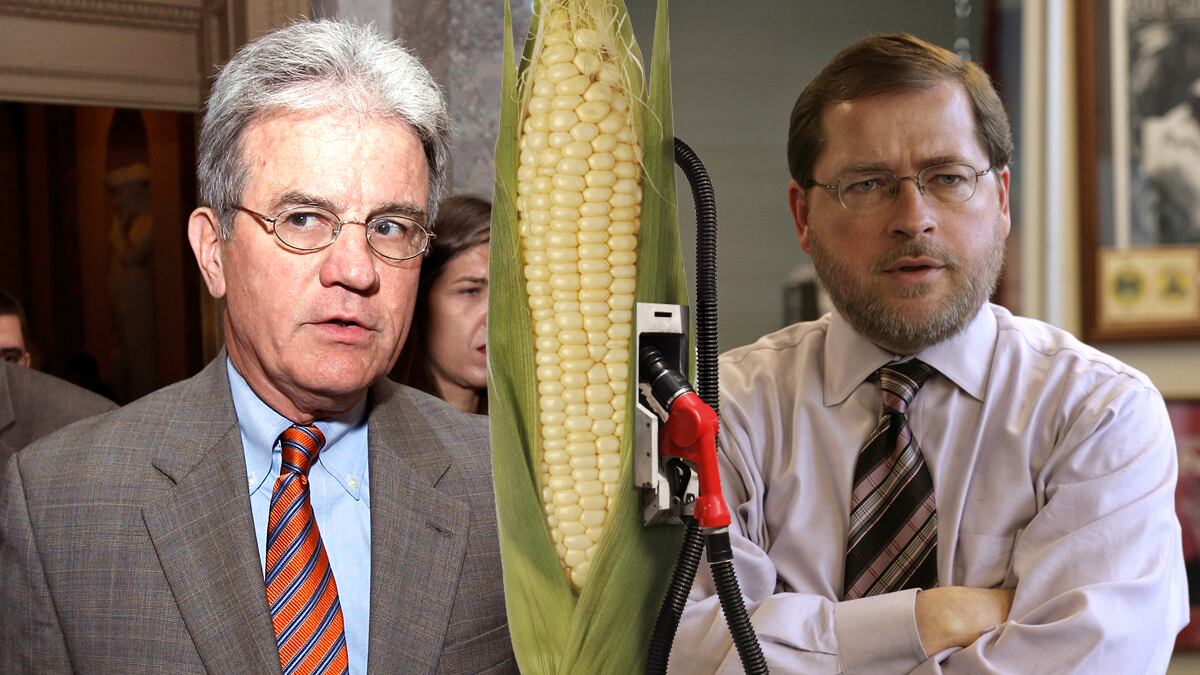Ethanol subsidies have been a sacred cow in American politics since the late 1980s, and their demise came Friday not with a whimper but with a bang. By a vote of 73 to 27, the Senate declared an end to what Republican Senator John McCain called the "corporate welfare" that had gone on for far too long, and that had become enshrined in presidential politics as a ticket of admission to the Iowa caucuses. Now the legislation moves to the House, where deficit-conscious Tea Party conservatives could provide a similar winning margin.
Members of both parties called the vote the end of an era, crediting the courage of a single senator, Oklahoma Republican Tom Coburn, with setting the stage and making possible a victory that many believed would never occur. In the context of the overall budget, the dollars saved are relatively small—about $6 billion a year—but the symbolism is huge for breaking the stalemate over the budget deficit that is currently paralyzing Congress and threatening the U.S. credit standing.
Ethanol—a corn-based fuel blended with gasoline—has long been championed by powerful Midwestern lawmakers, who routinely got a 45-cent per gallon tax credit renewed each year to the joy of corn farmers whose product is used to make ethanol and the blenders who mix it. They also managed for years to keep a tariff on imports of ethanol, giving the U.S. industry a distinct advantage.
But the legislation approved Friday, originally proposed by Coburn but this version sponsored by Senator Dianne Feinstein (D-CA) eliminates both the subsidy and the tariff.

The vote was a shot across the bow at one of the iconic figures in the Republican firmament, Grover Norquist, head of Americans for Tax Reform, whose stranglehold on his party over what constitutes a tax increase was challenged by Coburn. The fight between the two men got nasty with Norquist saying Coburn "lied his way" into office for signing a pledge in 2004 to never raise taxes, and then voting to end tax breaks for ethanol, which would mean higher taxes.Coburn responded by calling Norquist "old news," suggesting his grip on the party was outdated. Coburn's theory was tested in a preliminary vote Tuesday that came up 20 short of the 60 votes needed, but that attracted significant Republican support.Matt Bennett with the moderate Democratic group Third Way called Friday's vote "the first real sign of a crack in the dam Norquist erected against any Republican votes to eliminate tax expenditures." Nobody thinks they're going to vote to jack up taxes, Bennett added, but it's a sign that could signal more significant votes in terms of the deal needed to raise the debt ceiling, and potentially even what's referred to as "the grand bargain" that would restrain the growth of entitlements.Given the fiscal straitjacket the country is in, Republicans are vulnerable to the charge that they are being overly rigid in their opposition to raising revenue. A tax break of questionable merit suddenly seemed attractive. When it didn't pass muster with Norquist's pledge, the Reagan-era acolyte didn't play gentle, but he picked the wrong guy in taking on Coburn. An iconoclast who is both a rock-ribbed conservative and Barack Obama's best friend in the Senate when they served together, Coburn doesn't take guff from anybody. "He swung the hammer that put the crack in the dam," says Bennett.Coburn's courage gave his colleagues cover to follow him, and suddenly opposing ethanol subsidies was like pushing against an unlocked door and watching it fly open. Presidential candidate Tim Pawlenty had already made opposition to ethanol subsidies a cornerstone of his "tell the truth" campaign. Former Alaska Governor Sarah Palin, who comes from an oil and gas producing state, had jumped on the anti-ethanol subsidy bandwagon. New recruits like conservative Republican Steve King of Iowa also joined the fight.Republican operative Scott Reed, who managed Republican Bob Dole's presidential campaign in 1996 when Dole was known as "Senator Ethanol," called the vote "a victory for the good guys"—and for a political process that's been widely perceived as broken."A sacred cow since the late '80s, now it's run its course," Reed said. "A product that takes 300 gallons of water to make one gallon of ethanol, it's become absurd."In a speech on the Senate floor before the vote, McCain recalled a similar speech he had delivered in March of 1998 in what was then a futile attempt to end corn ethanol subsidies. Reflecting on what had changed over the years, he said ethanol never lived up to the claims that it would lessen reliance on oil, and the argument that it helped struggling corn farmers was undermined by higher consumer costs for beef and dairy as corn was diverted for ethanol.In the late 1980s it took off as the environmentally correct alternative fuel, but that's been disproved as well. McCain said the Department of Energy found it takes more energy to produce a gallon of ethanol than a gallon of gas. Still, special interests are resilient, and McCain warned that the industry was working on new ways to "bilk" taxpayers with an end run around Congress to gain federal support for ethanol blender pumps.That's another fight for another day. For now, Republicans are quietly celebrating the weakening of the anti-tax pledge, and the senator who made it possible, who dared to say that Grover Norquist's threats were old news, that the emperor had no clothes.






